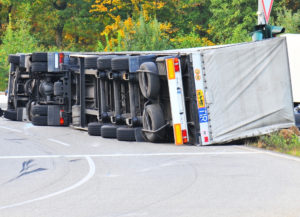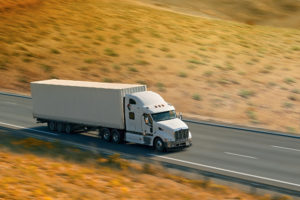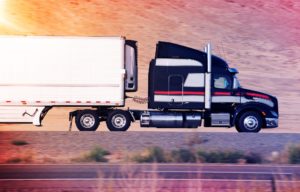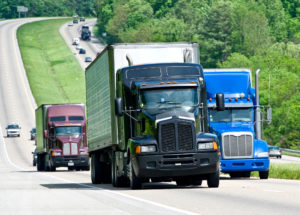
Oregon Truck Roll Over Crashes
What Causes Oregon Truck Roll Over Crashes, Per Our Portland Truck Roll Over Crash Attorney Everyone has seen it, whether in person, or in a
The trucking industry is an interstate business, meaning that it operates throughout may states across the country. This is because trucks haul cargo throughout the country to make delivery, from north to south to coast-to-coast. This is particularly true in Oregon for lumber and other natural resources, as well as electronic component and car manufacturing. This means many large commercial trucks will need to load up and travel through Oregon to make deliveries, and then come back. However, many truck drivers are not from Oregon and many trucking companies are not formed in Oregon. While Oregon has strong vehicle and traffic codes, the Federal Motor Carrier Safety Administration (FMCSA) has promulgated regulations which set the minimum standard for truck driver conduct, trucking company conduct, and maintenance or equipment requirements. Victims of any trucking accident throughout the United States, especially in Oregon, have rights under the FMCSA and should ask our Oregon federal compliance lawyers to learn what those rights are and how they can be protected.
This is because a truck driver’s or trucking company’s failure to ensure federal compliance may result in liability and an award of damages for any innocent people harmed in a big rig crash. An award of “damages” in an Oregon trucking accident is a monetary award used to help compensate victims for economic and non-economic damages, both in the past and in the future. Economic damages are damages which are calculable and actually spent such as medical bills, lost wages, equipment purchases, and property damage. Non-economic damages are damages such as pain and suffering, emotional distress, loss of affection from loved ones, other damages that cannot be quantified through calculation. Victims of trucking accidents may be entitled to both forms of damage, and a variety of specific forms of damage for federal compliance violations.
Important FMCSA Regulations That Require Federal Compliance
The FMCSA is a federal agency which specializes in and governs nearly all commercial vehicles. The FMCSA regulations are the bottom requirement that all truck drivers and trucking companies must comply with no matter what state they are from, traveling through, or going to. States are allowed to create stricter requirements, but in states that have lower requirements the FMCSA regulations apply.
There are many important FMCSA regulations which apply to large commercial trucks such as logging trucks, semi tractor trailers, big rigs, tankers, flatbeds, delivery vans, 18 wheelers, and other box trucks. The most important FMCSA regulations include the following:
Inspect Cargo – Truck drivers are required to inspect their cargo before their delivery, but also within the first 50 miles of driving and every few hours. This is to make adjustments to straps and ensure cargo is not shifting or straps are tearing.
Warning Signals and Cones – Disabled trucks are required to have emergency hazard flashing lights on immediately when the commercial vehicle stops, even if off road. Within 10 minutes of stopping, truck drivers must place cones behind the truck to warn oncoming vehicles and, in certain situations, even put cones ahead of the truck to warn motorists coming head on in another lane. If a vehicle collides with a disabled truck that does not have its emergency flashers on and signals or cones, it is likely a FMCSA violation.
Hours of Service (HOS) – Hours of service regulations govern how long a truck driver is allowed to operate a commercial vehicle. The purpose is to prevent truck driver fatigue. This is important because fatigue can slow reaction time or result in a truck driver falling asleep at the wheel. All hours of on service and off service must be recorded in a logbook. Violations of HOS regulations can be used to prove that a truck driver was negligent in a trucking accident, even if the truck driver did not fall asleep because HOS regulations also combat fatigue which slows reaction time. The most important HOS regulations include the following:
Alcohol and Drug Prohibitions – The strictest drunk driving laws in the United States are those by the FMCSA. While Oregon does has strict drunk driving laws which is .08 BAC for motorists and .04 BAC for commercial vehicle operators, the FMCSA regulations prohibit a truck driver from having any BAC—even just .01. In fact, the FMCSA regulations actually prohibit a truck driver from having any alcohol within 4 hours of starting a shift. Any violation of the FMCSA alcohol regulations is a serious offense and, if a truck driver caused an 18 wheeler wreck while having any BAC, this could be used as evidence of negligence.
Inclement Weather and Hazardous Conditions – FMCSA regulations require all commercial vehicle operators to use “extreme caution” during inclement weather or in hazardous conditions such as snow, ice, sleet, rain, fog, hail, or other conditions which affect visibility and traction. The FMCSA requires trucks to slow down to a safe speed which can be used to manage the hazardous conditions and, if no speed is safe, the truck will need to pull over and stop until it is safe to resume. Thus, even though the trucking industry is a “time is money business,” the FMCSA requires truck drivers and trucking companies to stop. Any accidents caused during inclement weather or hazardous conditions will almost always result in a violation of these regulation.
Bend/Portland, Oregon Federal Compliance Lawyers
If you or a loved one have been seriously injured or killed as a result of a trucking accident or collision contact the Oregon Truck Accident Lawyers at Kuhlman Law at our number below or fill out the intake form. We offer a free initial case evaluation and handle cases on a contingency fee which means that you pay no money unless we recover.
We handle cases throughout the state including Bend and Portland Oregon, Redmond, Central Oregon, Multnomah County, Deschutes County, Salem, Eugene, Corvallis, Lane County, Medford, Gresham, Albany, Medford, Beaverton, Umatilla, Pendleton, and Hillsboro.
We also have an office in Minneapolis, Minnesota and take Trucking accident cases throughout the Twin Cities, including St. Paul, Hennepin County, Ramsey County, Dakota County, Washington County, Anoka County, Scott County, Blaine, Stillwater, and Saint Paul Minnesota.
Please act quickly, there is a limited time (Statute of Limitations) in which you can bring a claim under the law.

What Causes Oregon Truck Roll Over Crashes, Per Our Portland Truck Roll Over Crash Attorney Everyone has seen it, whether in person, or in a

Portland Trucking Accident Lawyer Explains Causes for Truck Drivers Speeding and Causing Accidents in Oregon Trucks overpower other vehicles on the road all the time.

Understanding How 18 Wheeler Logbooks in Oregon Trucking Accidents Can Help Prove Big Rig Wrecks Truck drivers drive long days and nights, many times on

COVID-19 Increases Risks of Trucking Accidents: Portland Lawyer Explains COVID Trucking Risks in Oregon Truckers nationwide face a number of challenges now with COVID-19 in

Liability Explained by our Portland Trucking Accident Lawyer: Know Trucking Company Liability for Unrealistic Delivery Schedules Very few if any truck drivers work for themselves.

Liability Under FMCAS Regulations for a Drunk Truck Driver Causing a Portland Trucking Accident Drunk driving is a serious problem. According to the CDC, 29